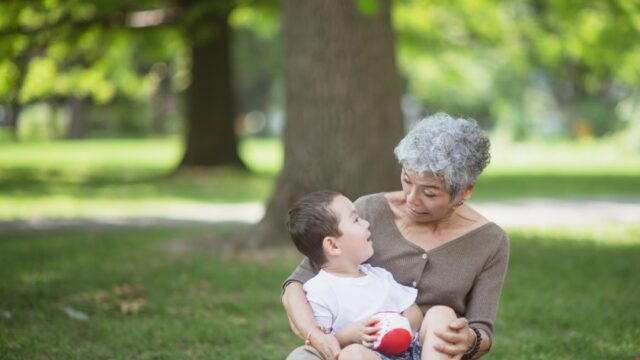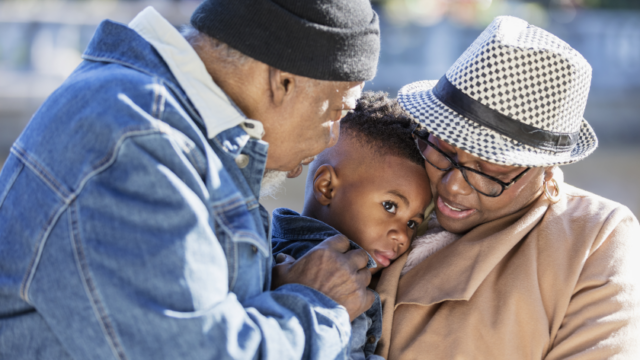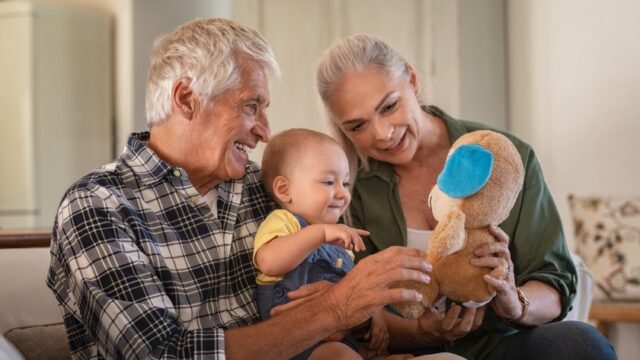Guide/Report
Including Kinship/Grandfamilies in State and Area Plans on Aging
Download This Resource


Background
Nationwide, grandparents, other relatives, and close family friends are raising over 2.4 million children whose biological parents are unable to do so for various reasons, including death, military deployment, and substance use. While research shows that both kin caregivers and children benefit from being in kinship/grandfamilies, studies also indicate that these families are disproportionally impacted by financial instability, disability, and trauma and that the well-being of all members of these families improves when they receive appropriate services.
Many organizations in the Aging Network have developed programs and services to support these families. A 2023 USAging report found that 53 percent of Area Agencies on Aging (AAAs) offer services specifically for kinship/ grandfamilies. Among Title VI Native American Aging Programs (Title VI programs), the proportion is higher, with 73 percent providing services for kin caregivers.
The interchangeable terms kinship families, grandfamilies,and kinship/grandfamilies refer to families in which grandparents, other relatives, or close family friends are raising children whose parents are unable to do so. To refer to the individuals who are raising the children in these families, this document uses the term kin caregivers.
Purpose of this Guide
This guide provides examples of language that agencies can use to include kinship/grandfamilies in their state and area plans on aging.
Federal Guidance on Plan Development
Following the passage of the 2020 amendments to the Older Americans Act, the U.S. Administration for Community Living (ACL) sent State Unit on Aging (SUA) directors a State Plan Guidance Letter that provided direction on many topics, including caregiving.
- ACL suggested that state plans on aging should include measurable objectives towards “enhancing services and supports for caregivers.” This includes kin caregivers and reflects recommendations from the RAISE Family Advisory Council.
- The letter also stated that AAAs should, “where possible, enter into arrangements with organizations providing day care services for children, assistance to older individuals caring for relatives who are children, and respite for families, so as to provide opportunities for older individuals to aid or assist on a voluntary basis in the delivery of such services to children, adults, and families.”
- ACL advised SUAs to coordinate their efforts with the Grandfamilies & Kinship Support Network: A National Technical Assistance Center.
See Generations United’s GrandFacts: Fact Sheets for Grandparents and Other Relatives Raising Children to find organizations in your community that support grandfamilies. Please notify Generations United of any needed updates to these living documents by emailing grandfamilies@gu.org.
ACL advised SUAs to consult recommendations from the RAISE Family Advisory Council’s Initial Report to Congress, released in September 2021, when developing their state plans on aging. These recommendations include a focus on the following:
- Increasing public awareness of the needs of family caregivers and the importance of supporting them.
- Increasing family caregivers’ awareness of the availability of information, services, and supports.
- Increasing the availability of respite services for family caregivers.
- Helping family caregivers access meaningful and contextually relevant information, services, and supports, including housing, nutrition, transportation, and services that reduce social isolation.
- Improving outreach to family caregivers to connect them to services and supports.
- Decreasing short- and long-term negative financial impacts on family caregivers.
Though not required, SUAs and AAAs also may wish to implement the recommendations from ACL’s Advisory Council to Support Grandparents Raising Grandchildren’s Initial Report to Congress, released in November 2021, including:
- Increasing the availability of childcare and other grandfamily-centered respite.
- Increasing the availability of no-cost or affordable legal and financial guidance or services for kinship/grandfamilies.
- Increasing the availability of mentors and peer support for kinship/grandfamilies.
- Increasing the promotion of evidence-informed, evidence-based, or model/promising practices to effectively support kinship/grandfamilies.
- Increasing the participation of kinship/grandfamily voices in the planning of services to support them.
ACL released final Older Americans Act (OAA) regulations in February 2024, updating regulatory policies for implementing OAA programs for the first time since 1988. Among changes made to rules on state and area plan development, the new regulations defined the term family caregiver to include older relative caregivers and defined the term older relative caregiver to include kin and grandparent caregivers of children. The OAA’s National Family Caregiver Support Program and Native American Caregiver Support Program have long included kin caregivers as eligible populations.
Sample Language
Many state and area aging plans already contain language about the needs of kinship/grandfamilies in their goals, objectives, strategies, activities, and evaluation measures. Some also include goals on coordinating with the Grandfamilies & Kinship Support Network. Examples are provided below.
No-cost technical assistance is available to SUAs, AAAs, and Title VI Native American Aging Programs via USAging’s partner, the Grandfamilies & Kinship Support Network, which is funded by ACL and run by Generations United.
Sample Language from State Plans on Aging
Arizona Division of Aging and Adult Services
- Goal: Increase awareness and understanding of aging issues to help prepare Arizona for an aging population.
- Objective: Strengthen and enhance information sharing on aging issues to promote support.
- Strategy: The SUA will expand evidence-based training for caregivers and grandparents or other older relatives raising children through the Family Caregiver Support Program.
Florida Department of Elder Affairs
- Goal: Improve and expand supports for older adults raising grandchildren.
- Objective: Work to connect grandparents to social resources through coordination with local partners such as public schools, pediatricians, and faith-based institutions.
- Strategies:
- Increase the availability of resources at community-based organizations and connect grandparents to resources and support groups.
- Identify, pursue, and secure funding for training programs or connect grandparents to existing funding for children.
- Inventory “children-centered” interagency resources and partners and establish a central repository of information.
Indiana Family and Social Services Administration
- Goal: Optimize the physical, emotional, and financial well-being of caregivers to strengthen their ability to provide ongoing supports and delay or prevent care recipient institutionalization.
- Objective: Expand efforts to improve caregiver health.
- Strategy: Explore opportunities to better serve and support the health and well-being of grandparents and other kin caregivers who are raising children through Title III E, leveraging resources made available via the Grandfamilies & Kinship Support Network: A National Technical Assistance Center.
Maine Department of Health and Human Services
- Goal: Support older Mainers and their care partners in remaining active and healthy in their communities of choice for as long as possible.
- Objective: Increase older relative caregivers’ awareness of and access to the National Family Caregiver Support Program.
- Strategy: Partner with state agencies serving children to co-promote the availability of care partner services to older relative caregivers.
- Evaluation Measure: Create informational resources about kinship services on the Office of Aging and Disability Services website by October 1, 2022.
Pennsylvania Department of Aging
- Goal: Increase enrollment in the Caregiver Support Program by five percent over the next four years.
- Objective: Support families and friends who are caregivers to enable them to thrive in their caregiving roles.
- Strategy: Enhance existing statewide marketing and outreach efforts to inform caregivers about benefits and services available through the caregiver support program, including respite assistance.
- Activity: Enhance statewide marketing/outreach efforts to expand participation in the Caregiver Support Program, especially for grandparents raising grandchildren.
- Evaluation Measure: Increase enrollment in the Caregiver Support Program by five percent over the next four years.
Vermont Department of Disabilities, Aging and Independent Living
- Goal: Bolster the recognition and support of all caregivers, including unpaid caregivers.
- Objective: Increase collaboration across the aging network to support grandparents raising grandchildren.
- Strategies:
- Collaborate with stakeholders and community members to coordinate a respite coalition to pursue the Lifespan Respite Care program.
- Utilize the Grandfamilies & Kinship Support Network: A National Technical Assistance Center for strategic planning.
- Collaborate with Vermont Kin as Parents to raise awareness about supporting grandparents raising children.
- Evaluation Measures: Numbers of public engagements and programs operated in Vermont focused on and supporting grandparents raising grandchildren.
Sample Language from Area Plans on Aging
AgeSpan, Lawrence, MA (formerly Elder Services of the Merrimack Valley and North Shore)
- Goal: Provide enhanced supports for caregivers of older adults and older adults with Alzheimer’s and related dementias, caregivers of adult disabled children, and grandparents caring for grandchildren.
- Objective: Enhance outreach to and supports for grandparents raising grandchildren.
- Evaluation Measure: Numbers of new referral sources, support groups, and individuals participating in support groups.
City and County of Honolulu Elderly Affairs Division, Honolulu, HI
- Goal: Enable older adults to live in their communities through the availability of and access to high quality long-term services and supports, including supports for their families and caregivers.
- Strategy: Provide person-centered support for family caregivers, including grandparents raising grandchildren, through training, education, counseling, respite, and referrals.
- Objective: Increase the number of caregivers who receive caregiver support services, as defined by the Administration on Aging and [HI] Executive Office on Aging.
- Evaluation Measure: Percent increase of unduplicated caregivers served, including grandparents raising grandchildren.
Eastern Idaho Community Action Partnership, Idaho Falls, ID
- Goal: Preventing institutionalization.
- Strategy: Advertise Caregiver Support Group, Powerful Tools for Caregivers, and Grandparents Raising Grandchildren groups on Eastern Idaho Community Action Partnership Facebook page and through focal point newsletters.
- Evaluation Measure: Number of group participants who learned about the group from Facebook.
High Country Area Agency on Aging, Boone, NC
- Goal: Lead efforts to strengthen service delivery and capacity by engaging community partners to increase and leverage resources.
- Objective: Offer information and assistance to family caregivers throughout the continuum of care.
- Strategy: The Family Caregiver Support Program will assist grandparents raising grandchildren and older relatives as parents by:
- Providing helpful resources for grandparents raising grandchildren and older relatives as parents (continually).
- Assisting grandparents raising grandchildren and older relatives as parents with supportive services to help them better care for the children (continually).
- Hosting one event annually focused on grandparents raising grandchildren and/or older relatives as parents to provide respite or education support (by 2024).
Non-Metro New Mexico Area Agency on Aging, Santa Fe, NM
- Goal: Provide additional resources to assist grandparents and other adult caregivers who are raising children.
- Objective: Expand Grandparents Raising Grandchildren Services to meet community demand.
- Evaluation Measure: Two percent increase in unduplicated consumers for OAA grandparents raising grandchildren in-home respite services, counseling, and vouchers, if adequate funding exists.
Valley Area Agency on Aging, Flint, MI
- Goal: Work to improve services and outreach to older adults and caregivers.
- Objective: To increase accessibility and programming for older adults, caregivers, and Kinship Caregiver Programs.
- Activities:
- Hold fundraisers and utilize other funding sources (i.e., grants) to fund the clothing voucher program for kin caregivers.Develop an application for kin caregivers to apply for a $250 voucher.
- Provide kin caregivers with the option to pick up donated bags and clothes for the children in their care.


